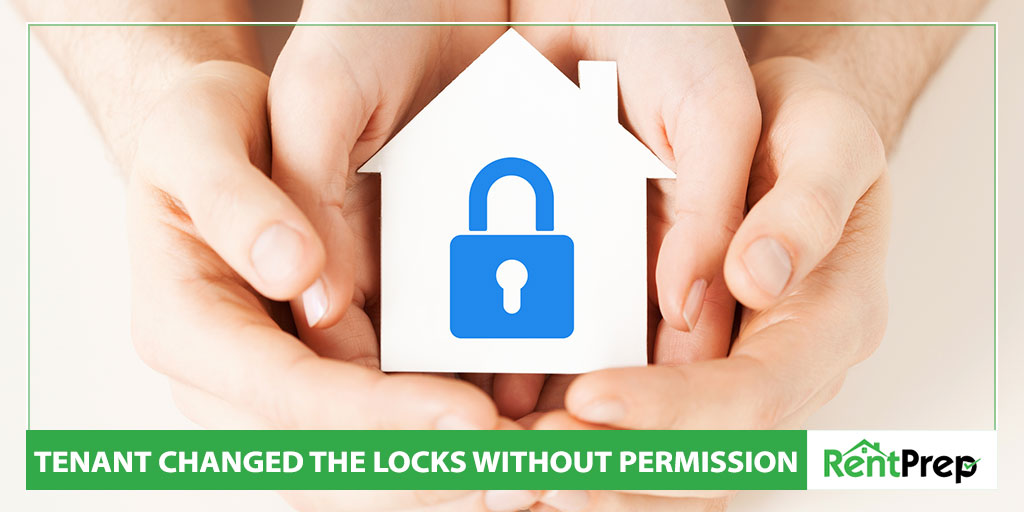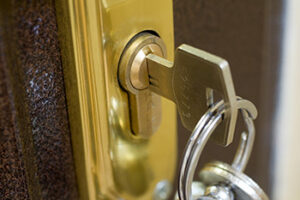
If a tenant changed the locks without permission on the rental property once they move in, is that okay? Or is this against proper rental regulation?
Think about it this way. When a tenant is living in one of your rental priorities, they take over many of the rights associated with property ownership. If the tenant changed locks without permission, is that within their rights?
While tenants can expect to have uninterrupted use of the property except for in specific situations, it’s not always clear to landlords if that includes changing locks without permission or notice. The rules about changing locks vary, but they are important to get right.
Today, find out what you need to know about lock changes at your rental properties. The rules about this might not be exactly what you think they are, and getting them wrong could lead to a legal nightmare! Avoid that risk by learning what you need to know right now.
A Table Of Contents On Changing Locks Without Permission
- What To Do: Tenant Changed Locks Without Permission
- Why You Need Access To The Property
- Landlords Have Limitations Too
- Creating The Right Precedents
- FAQs: Tenant Changed Locks Without Permission
What To Do: Tenant Changed Locks Without Permission

Generally speaking, most lease agreements do not permit tenants to change the locks without permission. In states where the rules surrounding this are more restrictive, the lease may forbid tenants from changing the locks without notifying landlords and giving them a copy of the key immediately.
If you discover that your tenant has changed the door locks without permission and without alerting you, you may be at a loss for what to do next. Let’s work through your next steps so you can create a plan of action.
State-By-State Issue
The final answer about whether or not a tenant can legally change the locks is ultimately a state-by-state issue. Regardless of what your lease agreement says is or is not allowed, the final ruling can be found in state and local laws.
Most states permit landlords to only allow tenants to change locks in serious situations and with notice, but there are some exceptions to that.
Tenants typically need to ask for permission before changing the lock, but some states will not allow tenants to be penalized for changing them as long as the landlord is provided with an updated key.
In New Jersey and California, for example, tenants have the right to change locks without giving a landlord a key. At the same time, landlords in those states are permitted to include additional clauses in their lease to prevent that from happening.
Can a tenant change the locks without the landlord’s permission in your state? Before you make any move to handle the lock changing, make sure you read up on your local laws so you are fully informed.
Contact The Tenant For Access
The first thing you should do when you discover that the tenant had the locks changed without informing you is to contact them for access. You would only discover this discrepancy if you have a reason for entering the property, such as scheduled maintenance, so the tenant should not be surprised by this.
Give them the benefit of the doubt. Contact the tenant asking for a copy of the key, and explain what the rules are regarding the locks and keys. The tenant needs to provide keys within a reasonable time frame.
Make sure to keep documentation of your conversations to ensure there aren’t any disagreements about what happened later on.
Charge Them
If you live in a state where tenants are allowed to change the locks, you are permitted to deduct the cost of reinstalling or replacing the original lock from their security deposit at the end of their tenancy.
Most landlords won’t feel the need to do this so long as they are provided with the new keys, but some landlords may prefer to use a specific type of lock and want it to be replaced.
As the property must be returned in the same condition it was rented out in and you did not give permission to change the locks, it would be permissible to deduct from the deposit for this expense.
You are also permitted to rekey the lock immediately and charge the tenant for this cost if you cannot access the property in an emergency but need to do so as long as your lease is clear that emergency access is permissible.
Force Entry If Necessary
If you need to access the property immediately because of an emergency, such as a fire or a leak, you can call a locksmith or break down the door. These steps should only be taken in cases of a true emergency when the tenant cannot be reached.
Entering the property without notice and by force in a non-emergency situation is going to lead to legal trouble between you and your tenant, so this should be avoided at all costs.
Why You Need Access To The Property

Tenants who changed their locks without permission or asked about changing locks might not understand why you need access to the property. In their mind, they can always let you in if there is a repair that needs to be done.
Here are some of the reasons you might need to be able to enter the rental property. Walk through these reasons with your tenant to help them to understand better.
Scheduled Inspections
Rental properties are typically inspected at least once a year. Notice is always given before these inspections happen so the tenant can be at home if they want to be, but sometimes, you will need to enter to do the inspection when they are not there.
Repair Management
If there are cases when the tenant cannot be at home to let a repair person into the property, it will be up to you to open the door. Sometimes, the landlord is the one doing the repairs, so them being able to enter with ease to do the repair can be important.
Emergencies
As mentioned above, the most pressing reason a landlord needs to have a working key to the rental unit is in case there is an emergency. Some emergency situations need immediate attention.
If the tenant changed the locks without permission and the landlord can’t get in, the problem could get out of control. Minimizing damage from emergencies is only possible if the landlord can get into the property.
Abandoned Property
There are cases in which a tenant may abandon the property. If they changed the locks before abandoning the property, it will be difficult to access the property to take the necessary next steps.
Landlords Have Limitations Too
Just as there are limitations placed on when tenants can change the locks of their apartments, there are also limitations on when landlords can and should replace locks.
Secure Premises
Tenants have a right to live in a habitable apartment. For rental properties, the definition of habitable includes the property having a secure entrance with a lock.
Many states require or suggest that landlords change or rekey locks between tenants. This ensures that any copies of the previous tenant’s key will not work.
Tenants may request proof that this has been done. If the tenant doesn’t receive the proof, some states allow tenants to replace the locks themselves and withhold the cost from their rent.
No Lockouts
While landlords should change locks between tenants when possible, they should never change the locks without giving a key to their tenant. Changing the locks without giving your tenant a key is considered a lockout, and this is illegal in most states.
This action is illegal because some landlords have tried to use this technique to kick tenants out when they don’t pay rent on time or otherwise break the lease agreement. Even if your tenant breaks the lease agreement, you cannot lock them out. Instead, you must follow proper eviction protocol.
Creating The Right Precedents
The best way to avoid any complications with changing locks and miscommunications surrounding locks is to spell it all out in the lease.
Including a lock policy that lines up with your local laws in your lease agreement is essential. Most lock policy clauses will forbid tenants from changing the locks without a landlord’s consent, but the specifics can vary from contract to contract.
Regardless of the specifics, make sure to clearly state all of the following in your lease agreement:
- Whether or not tenants are allowed to change the locks
- What tenants should do if they want to change the locks
- What landlords will do if they need to change the locks
Having clarity in the lease about this issue will not only protect your property, but it will also help prevent confusion between you and your tenant.
FAQs: Tenant Changed Locks Without Permission
Can A Tenant Change Door Locks Without Landlord Permission?
The answer to this question depends on what state you are located in, but in most cases, there is not a specific law that prevents tenants from changing the locks on an apartment.
That being said, the lease in place will typically prevent this practice. Usually, the lock policy in a lease can require that tenants give a key to the landlord as soon as locks are changed, but very few areas outright disallow the practice in their laws.
Can a tenant change the locks without permission if the lease and state laws do not mention anything about locks? Yes, but they should still provide the landlord with a key for access.
Can A Landlord Change Locks After 30-Day Notice?
As a landlord, you should never change the locks before a tenant lease is terminated and they have completely left the property. Even if you have given a 30-day notice and moved forward with eviction, you are not allowed to force the tenant to leave the property by locking them out. In fact, this could lead to a lot of trouble with the law.
If you are having difficulty getting an evicted tenant to leave, you will need to take your writ of possession to your local sheriff. They will then help you to enforce the eviction and regain full control of your property.
Can You Change The Locks On An Apartment?
You are permitted to change the locks on an apartment that you own at any time, even while occupied by a tenant, as long as they are provided with a new key immediately. As mentioned above, you cannot change the locks on an apartment with the intention of locking a tenant out.
Are Landlords Responsible For Door Locks?
Landlords are responsible for ensuring that the property is safe to live in, and that means they are responsible for working and property protected door locks to be in place at each of their units.
Between rentals, it is often recommended that landlords change the locks or have them rekeyed. This can reinforce the safety of the unit as it will prevent any former tenants from accessing the unit with a copied key.
As a landlord, you are responsible for making sure that working and safe door locks are in place on all exterior doors in your units.
Conclusion
Though it may seem counterintuitive to some lawyers, there are many states that allow tenants to change the locks on your property as long as they get permission. If they do not get permission, however, you still have limited options on how to proceed. Ultimately, you need to be familiar with your local laws to be certain about what is and what is not allowed.
To prevent any confusion or distressing situations regarding changed locks, make sure you do the following:
- Research the laws that will apply to your specific properties.
- Include a lock policy clause in your lease so all parties have clarity.
- Keep communication between you and your tenant open.
As long as you are aware of what could go wrong with a tenant changing locks without permission, you can prevent that situation from ever occurring. Being prepared as a landlord is one of your greatest weapons; make sure you are wielding it!

